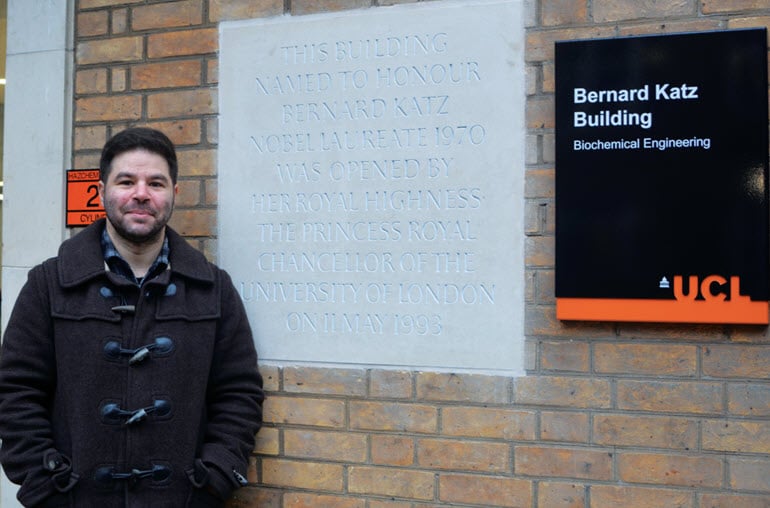Keywords:
High throughput bioprocess development is essential for optimizing run parameters prior to scale-up. University College London’s Advanced Centre for Biochemical Engineering is harnessing the possibilities afforded by automation, using custom-built scripts and programs to make its liquid handling platforms accessible to inexperienced users.

University College London’s interdisciplinary Advanced Centre for Biochemical Engineering (ACBE) is a world leader in the development of novel bioprocesses and, in 2013, was awarded a Queen’s Anniversary Prize for Higher and Further Education in recognition of its ‘outstanding excellence’. Automation is at the very heart of its success, and the department uses six Freedom EVO® platforms to accelerate its research. Dr Spyridon Konstantinidis, a postdoctoral research associate, explained: “We apply quality by design to bioprocess development, using high throughput automation to screen out unfavorable conditions and determine the ‘sweet spot’ for each process through efficient and effective experimentation. This maximizes the amount of knowledge we have about a process in early development stages, simplifying further downstream activities and scale-up.”
“A key step in many of our processes is the development of effective separations of the biomolecules of interest from other matrix and cellular components, and we use* OPUS® RoboColumns® (Repligen) in combination with a Freedom EVO 200 to support these studies. This approach is highly regarded in both industrial and academic environments, allowing eight columns to be run in parallel using the platform’s eight-channel Liquid Handling Arm™. This enables us to collect more than 70 fractions per column in 96-well microplates over an eight hour run, followed by analysis using an Infinite® M200 PRO multimode reader for absorbance and fluorescence measurements.”
“We purchased the Freedom EVO workstation to run these studies in 2015,” Spyridon continued. “We had not previously run this type of experiment with the RoboColumns, and identified early on that users would need intensive training on the instrument to make the most of its capabilities. The RoboColumn experiments are not simple to automate, as there is so much movement of labware and numerous aspirations from different locations; everything needs to be coordinated. Working competently with robotics often requires programming skills and, as the person with the most experience in this in the lab, I was having to spend quite a lot of time helping casual users and overseeing their programming. We therefore needed to find a way to make the automation easily accessible to non-experts. The solution lay in developing a custom Freedom EVOware® script to guide end-user inputs, deploy compiled applications, generate worklists, and execute common and advanced commands.”
"Freedom EVOware allows us to create these custom scripts and access advanced commands to unlock the potential of the system – it’s a very powerful tool."
“This ‘scaffolding’ script takes the user though everything step-by-step. The script is divided into five parts, and the first phase asks the user to define the inputs and prepare the system. Custom screens guide the users through the available options, such as the number of columns, fraction size, etc. The software also guides them through preparing the system – putting the columns on the platform, loading solutions, etc. – and this whole process takes approximately 30 minutes. After this initial input phase – which takes only five to 10 minutes – calculations are performed automatically, and worklists are generated. The process does not require any end-user intervention after this point, as the remaining stages – chromatography, fraction collection, measurement and volume determination of fractions and blanks, and results processing and reporting – are fully automated.”
“There are a total of 165 inputs to manage, due to the high levels of flexibility that we need. However, the beauty of this method is that we can carry out many different separations using one deck configuration, and so a majority of these inputs are classed as ‘defaults’, avoiding any alterations to the script. One of the benefits of developing our own script is that we can also program the platform to perform separations in parallel with different durations, and this additional functionality is a real bonus.”
“Freedom EVOware allows us to create these custom scripts and access advanced commands to unlock the potential of the system – it’s a very powerful tool. With most other platforms, you never even get to see this software architecture, and so the options are limited. But Tecan’s software gives developers these tools and allows them to innovate. As a result, we’ve been able to generate a lot of commands with our own custom programs; it’s a massive step forward for our work and enables the platforms to carry out very sophisticated actions.”
“The support from Tecan has also been helpful. Every January, Tecan runs a training course for first-time users, and we’ve benefitted from these sessions; bouncing ideas off them and seeking their advice when it comes to implementing certain commands or functions. The driving force behind our custom script was making automation more readily available, and we now have seven students who have used the platform unsupervised to complete their investigations – it’s been a real success.”
To find out more about Tecan’s liquid handling solutions, visit www.tecan.com/parallelchromatography
To learn more about ACBE’s work, go to www.ucl.ac.uk/biochemeng/research
Keywords:









